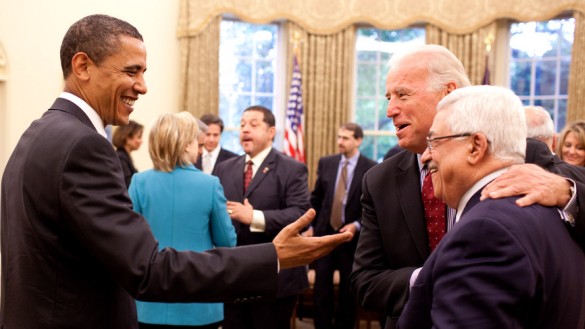PA officials: U.S. wants borders to top peace talks
By Avi Issacharoff, Haaretz, August 7, 2009
The U.S. administration will demand that Israel and the Palestinians address the issue of borders as the first step in the Middle East peace plan, senior Palestinian officials said Thursday.
Defense Minister Ehud Barak said Wednesday that Washington will present its new plan for a comprehensive Middle East peace soon.
The Americans will also outline proposals for an Israeli peace with Syria and Lebanon, the Palestinian officials said Thursday. The American plan will not specify step-by-step actions for an Israeli-Palestinian solution, but will address final status issues – borders, Jerusalem and refugees.
The Americans will set a timetable of about a year and a half for the negotiations and demand the sides first solve the border issue, under the belief that this will lead to solutions for other issues, such as the settlements and water. After that the sides will discuss the other fundamental issues – Jerusalem and the refugees.
The negotiations between the Israelis and the Palestinians probably will be conducted in the presence of American officials, the sources said. The American administration is likely to present its plan before or during the UN General Assembly set for September.
Saeb Erekat, head of the PLO’s negotiating team, denied knowledge of the plan.
Erekat said that George Mitchell, the special White House envoy to the Middle East, said in recent meetings that the administration needs several more rounds of talks to draft a peace plan.
Mitchell is supposed to meet Prime Minister Benjamin Netanyahu again within the next two weeks.
During this period the Americans hope to reach understandings about the settlements, which would enable talks to resume.
PA chairman Mahmoud Abbas is refusing to resume talks before Israel halts construction in the settlements. However, once Washington reaches understandings with Israel to suspend construction, Abbas would not be able to maintain his refusal, the Palestinian officials said.
The debating continued Thursday at Fatah’s sixth convention, which is due to end today after delegates elect leaders for the movement’s institutions. It is not clear whether Fatah’s delegates from Gaza will take part in the vote remotely, since Hamas has refused to let them attend.
Tension between Mohammed Dahlan and Fatah’s old leadership flared up again after Dahlan’s associates accused the old guard of appointing cronies as delegates to prevent the middle generation from being elected.
Dahlan threatened to have his supporters boycott the vote unless a solution is found for the Gaza delegates.
Commentators said yesterday that Fatah is unlikely to undergo dramatic leadership changes. Marwan Barghouti and Jibril Rajoub, of the middle generation, are considered to have relatively high chances of being elected to the central committee.
Israeli envoy: Obama row causes strategic damage
By Barak Ravid, Haaretz, August 7, 2009
Prime Minister Benjamin Netanyahu’s attitude toward the Obama administration is causing Israel strategic damage, in the view of a senior Israeli diplomat in Boston, Channel 10 television reported yesterday.
Consul General Nadav Tamir’s reported comment is a rare internal rebuke, highlighting the growing tension between Washington and Jerusalem.
Tamir is a highly regarded veteran diplomat whose opinions on foreign policy matters carry considerable weight.
Such blunt, pointed criticism of a prime minister’s policies by a professional diplomat is considered unusual.
In an internal memo addressed to the Foreign Ministry in Jerusalem, Tamir wrote that the public spat with the United States over the issue of a settlement freeze has alienated a significant number of American Jewish supporters, Channel 10 reported.
“There are political elements in America and Israel who oppose Obama on ideological grounds and are ready to sacrifice the special relationship between the two countries for the sake of their own political agendas,” he wrote.
While Israel and America have long disagreed over the settlements, “there was always a measure of coordination between the governments,” Tamir continued.
“Nowadays, there is a sense in the United States that Obama is being forced to deal with obduracy from the governments of Iran, North Korea, and Israel.”
“The administration is making an effort to play down the disagreements, and we are the ones who are actually making the differences public,” Tamir added.
Tamir also accused Netanyahu of endangering American Jewish backing for Israel by publicly sparring with Obama administration’s over the construction of Jewish housing in the West Bank and East Jerusalem.
A spokesperson for Netanyahu said Tamir’s comments were not worthy of comment. A senior associate of the prime minister said that “this is an unprofessional document … reflecting the writer’s personal political views. It’s a pity that an Israeli diplomat should launch an attack like this on Israel’s policy and try to cause deliberate damage.”
The consulate in Boston said the memorandum was an internal Foreign Ministry document that was not for the media’s consumption.
Several Foreign Ministry sources described Tamir as “highly intelligent,” but others said he was too “ivory tower.”

